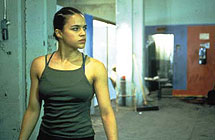|
|
|
|
Girlfight
|
 |
|
If you go to Girlfight expecting a high-voltage, emotionally draining entertainment about women in boxing, you are likely to be disappointed. Its message is affirmative and uplifting, but its general tone is low-key and naturalistic, far from the energy and glamour of a standard Hollywood sports movie. Written and directed by newcomer Karyn Kusama, Girlfight is squarely in the école of John Sayles (City of Hope [1991], Limbo [1999]) – not the best school in which to be enrolled. In any other sports movie, teenage Diana (Michelle Rodriguez) would use her career in the ring to bust out of her humble, somewhat oppressive milieu. Kusama eschews such fantasies of upward mobility, and keeps her more or less in her place. What is important for Diana and for the film is a sense of self-worth – and this turns out to be a hard-won commodity. Diana struggles (at one point violently) against the attitudes of her father, Sandro (Paul Calderon), and fends off jibes from most people around her. Fortunately, her best girlfriend, Marisol (Elisa Bocanegra), is quickly convinced that the idea of a girl fighting professionally is cool. Kusama tries her best to sidestep the formulaic conventions of several genres, including success stories, sports movies and teen films. She falls into an easy formula of her own, however, by making Diane's brother, Tiny (Ray Santiago), a sensitive boy who doesn't really want to box, as his father decrees; and by creating Adrian (Santiago Douglas), a dreamy partner for Diane both inside and outside the ring, who puts up little resistance to her campaign of self-improvement. Anyone who makes a movie about boxing has to figure out how they want to show the often brutal physicality of this most divisive and contentious of sports. Kusama passes no moral or political judgment on boxing. Her attitude seems to be: if it's good enough for Diana, it's good enough as the premise for a feminist film. So Girlfight avoids the deliberate, graphic ugliness of Martin Scorsese's boxing scenes in Raging Bull (1980). Equally, it sidesteps the macho-fun treatment of blood, wounds and head pains seen in Play It to the Bone (1999). Kusama's coverage of the action in the ring is mostly in two-shots and wide-shots; it's more like a dance than a pummelling combat. Although the film aims for a surface realism of detail in most respects, it goes somewhat soft in these crucial sequences. Girlfight is not an especially compelling movie but it does offer some fine characterisations – especially Hector (Jaime Tirelli), the no-nonsense trainer who takes Diana under his wing. The best element of the film is undoubtedly Rodriguez – a fresh and natural performer whose presence is truly electrifying. For once the cliché is true: the camera loves her. And Kusama, to her credit, wastes no opportunity to place her dead centre of the frame or to highlight her in enormous close-ups. Intensity may be missing from the drama and the action, but it flares up with every vision of this extraordinary woman. © Adrian Martin November 2000 |
![]()